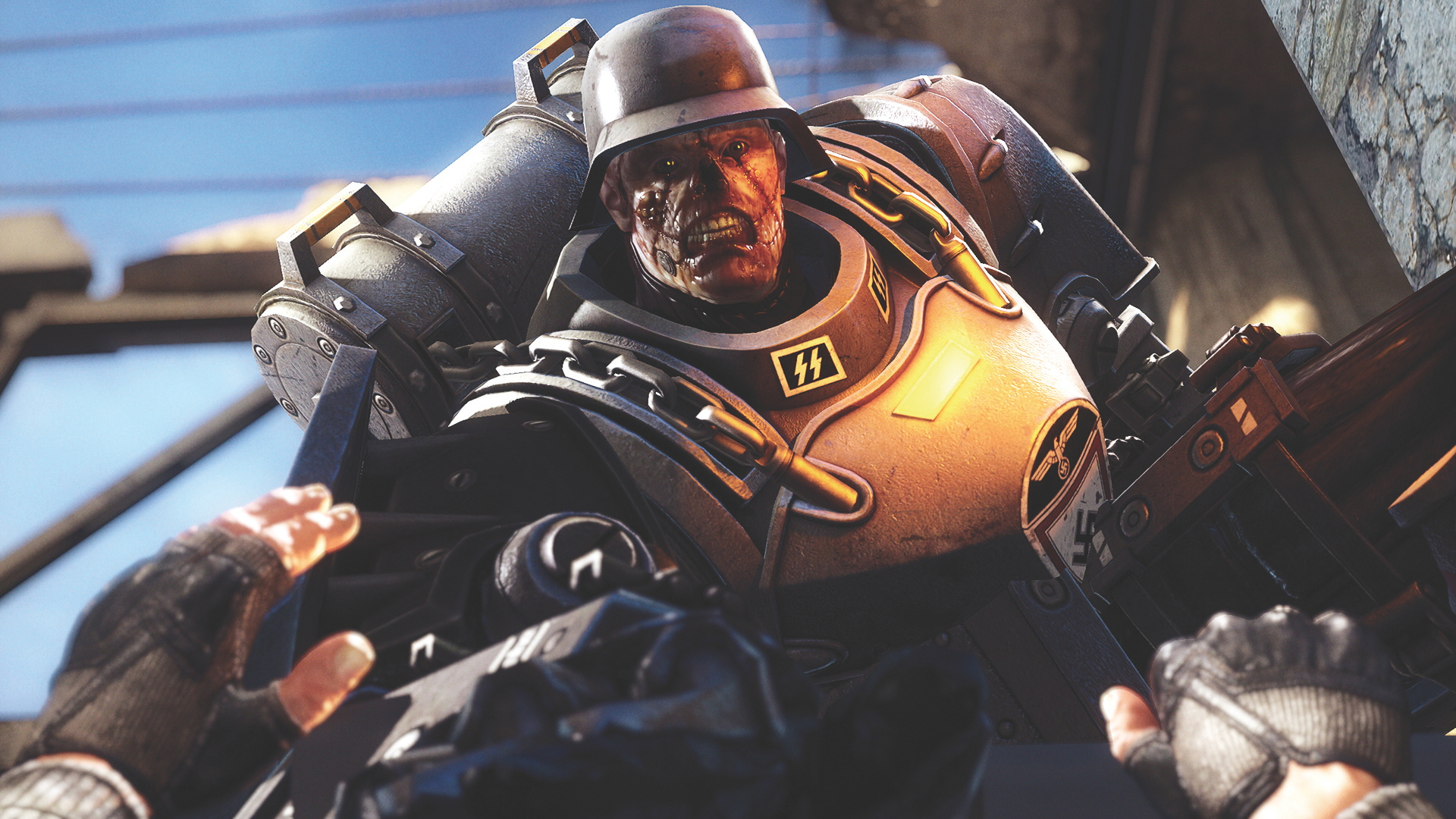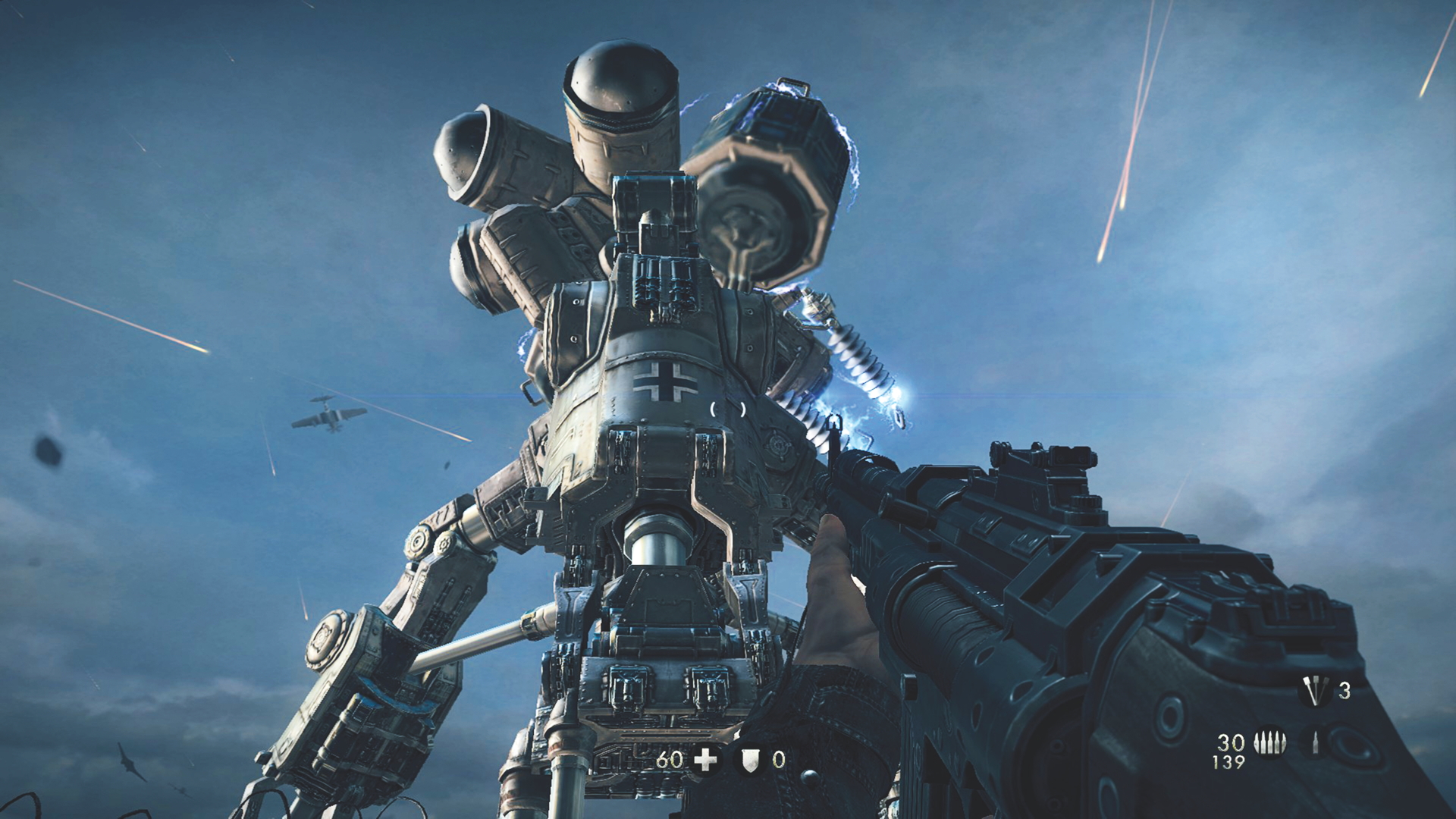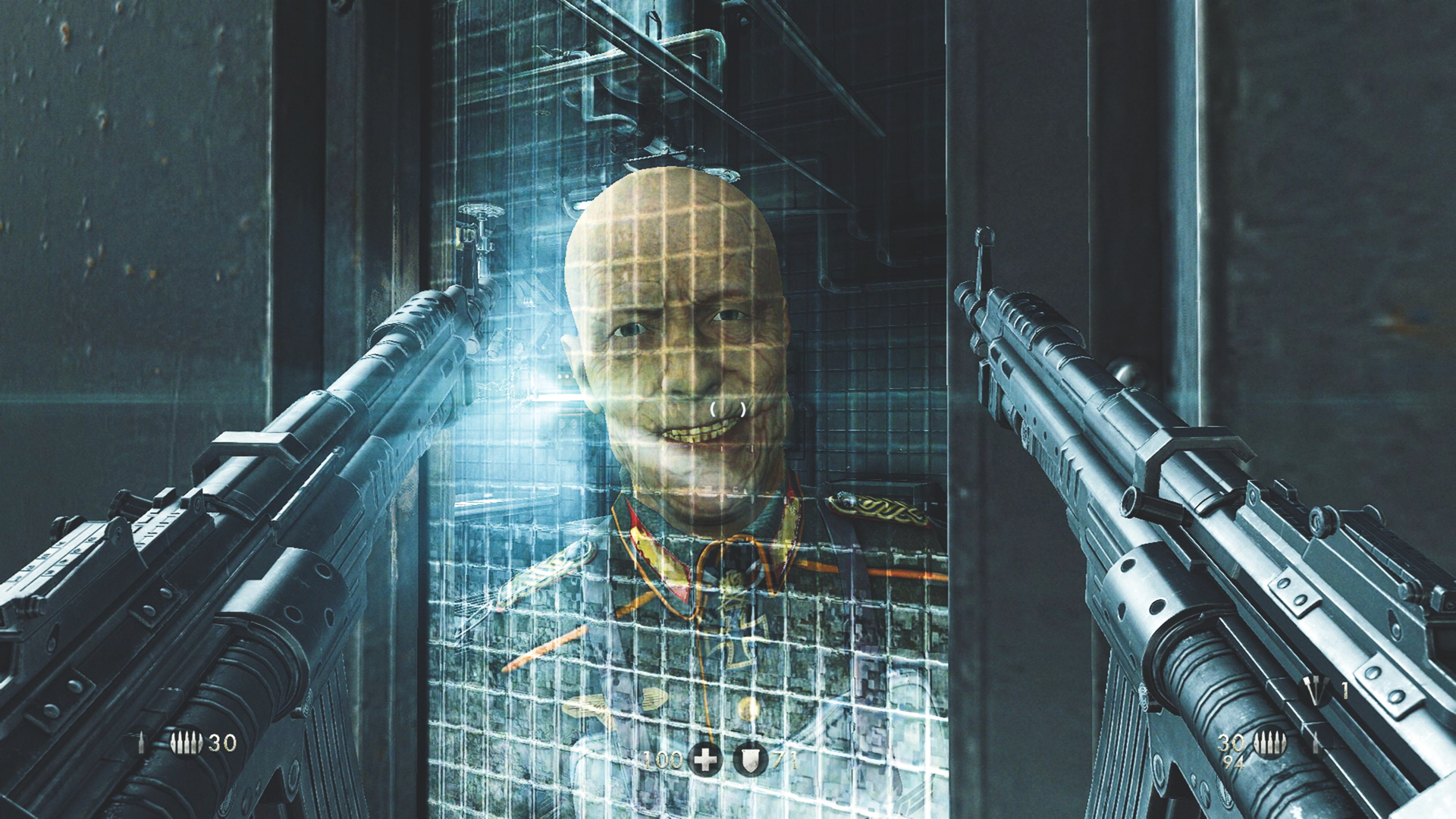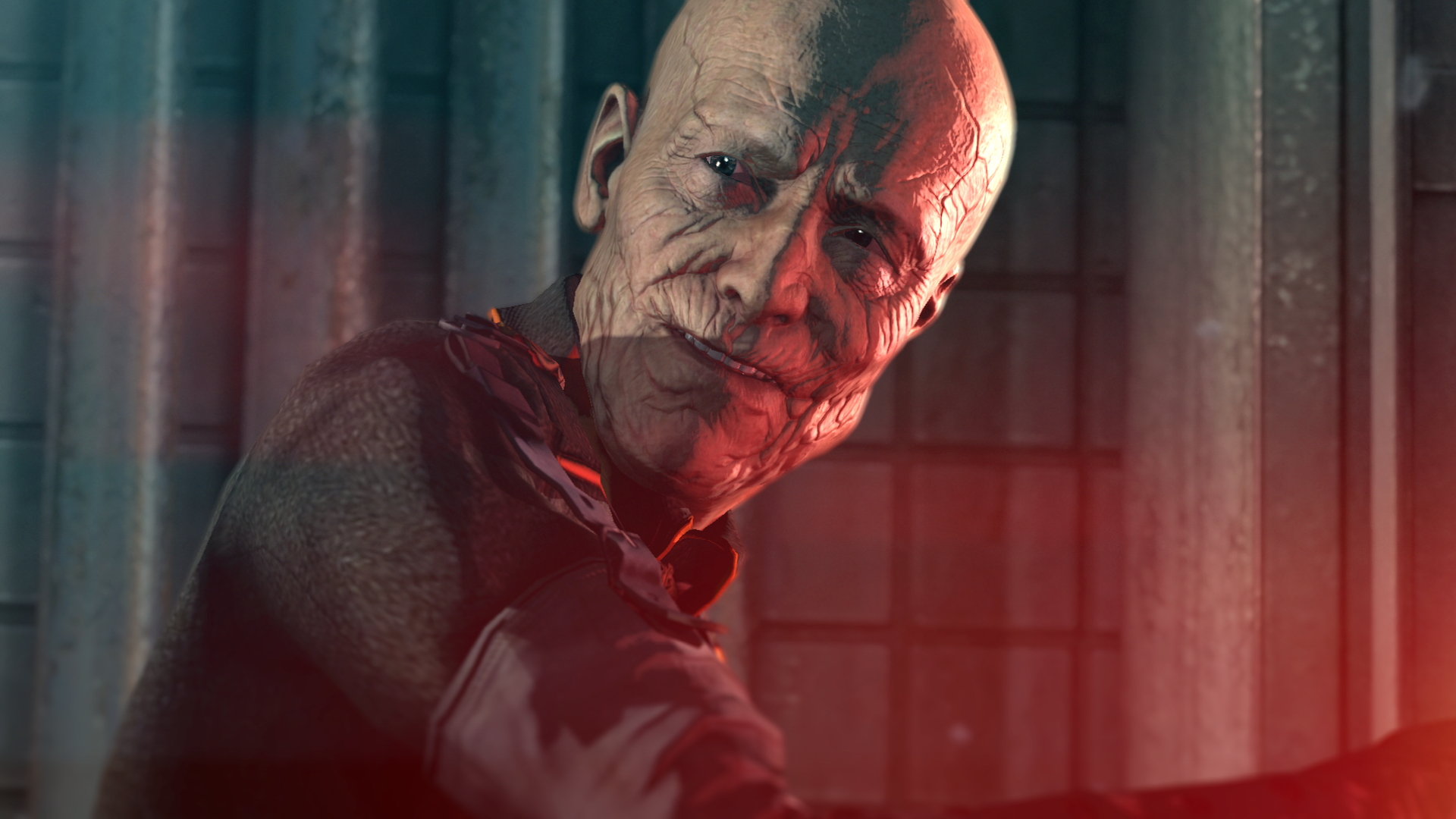Denting the Nazi war machine and admiring damn fine coffee physics in Wolfenstein: The New Order

I came away from E3 this year with a greater sense of self-loathing than usual. Wolfenstein 2: The New Colossus was the most exciting game of the show – a blend of pulp adventure, hippy weirdness and bald savagery – but somehow, I’d managed to miss the prequel, The New Order. Perhaps it came out at the wrong time? Or perhaps I wrongly dismissed it as a dimwitted shooter while I was trying to unravel Child Of Light, or some similarly earnest indie game. Truthfully, my feeble excuses no longer matter: I’m going to fix things by playing The New Order with the force of a thousand hurricanes.
The first thing I notice, apart from the pleasingly frantic opening, is that Wolfenstein is the smartest kind of stupid – the kind that’s actually marvellously clever, because it’s precisely aware of how dumb you think it is. For example, when your fellow soldiers talk about ‘the Nazi war machine’, they mean it quite literally. It’s right there in front of you: a tripedal, mechanised tank, disintegrating Allied troops with a superpowered death ray. These cheerful in-jokes are everywhere. Every World War 2 trope is given a knowing twist; the sort of references you can only make if you truly understand your subject matter. Wolfenstein might look simple, but there’s nuance there. Pretend that Marcus Fenix writes cryptic crosswords, and you’re on the right lines.

Back in the game, I’m weaving in and out of the war machine’s legs as I sprint toward the Nazi stronghold, like Saving Private Ryan but with the earnestness swapped out for robot dogs. There’s incredible craft underneath the obvious brutality. My objectives seem straightforward – open the door, scale the castle, win World War 2 – but I’m struck by the variety of ways I can complete them. It’s equally possible to achieve a goal by bursting into a room wielding as many guns as I have limbs as it is to sneak in gently, throwing knives and slitting throats. I also love how my skills expand to reflect this: the more people I silently murder, the better BJ Blazkowicz gets at it. It’s rather like writing about games, except the only thing I’ve got better at is inserting self-referential similes. So meta.
After two attempts, I take out the Nazi war machine (the literal one, sadly). I push on to the finale of the first level and the inevitable confrontation with my nemesis, General Deathshead. He’s a brilliant baddie – like white supremacist dried fruit – and the game does a superb job of introducing him. He grins at me through a tiny window as I realise we’re trapped in a room with shrinking walls. It’s too much to hope that I’ll get to kill him in my first session, but I’m excited about the prospect of coming back to gut him later. Your dried-fruit ass is going into a freedom breakfast, you shrivelled Nazi prick.

For now, though, there is only despair. Not only do I not get to kill him, I have to watch as he dissects my buddies. It’s hugely grim and slightly frustrating, not least because I mess up the moral choice it offers me. I get to choose who lives and dies out of wide-eyed new boy Wyatt and Fergus, our chipper but foul-mouthed Scottish commander. To start with, I kill Fergus, because I think he’ll stoically accept death. True enough, he takes being sliced up like a champ. But afterwards, when I’m left trying to escape with Wyatt, I change my mind, because I don’t want to spend the rest of the game alongside a character with all the narrative impact of a Greek-style yoghurt. So, I restart the level and let Fergus live instead. And now I feel twice as guilty because I’ve essentially murdered both of them and cheated. It’s pretty scummy, I know, but Fergus reminds me too much of beloved OXM contributor Dave Meikleham to be sacrificed.
Then, just when I think I can’t hate Nazis any more, The New Order hits me with the shocking opening to the second chapter. Blazkowicz is convalescing under the care of the wonderful Anya and her family – the first glimpse of true gentleness I’ve seen in the game so far. As expected, everyone gets butchered, but getting revenge feels amazing.

As I stab my way out of the asylum to rescue Anya, I’m hit by how lovely it feels to kill Nazis. Truly, there is no way to murder them that’s too pitiful or horrific. And as brutal and disgusting as this all is, it’s given true meaning by the slower moments. If there’s one thing Wolfenstein does surprisingly well, it’s dynamism. The frantic sections contrast brilliantly with the quiet, introspective bits that every other shooter seems to have forgotten (you’re right to look red-faced, Call of Duty). It’s more impactful – and I can scarcely believe I’m writing this – because Blazkowicz is such a compelling, damaged hero. His broken monologues give me a real sense of everything he’s lost. It’s remarkably soulful stuff from a man with shrapnel in his head, and it gives the game a wistful, road-movie vibe. One moment he’s saying ‘f**k you!’ to the Moon – yes, the actual Moon – the next he’s making me care about characters I’ve barely met.
Weekly digests, tales from the communities you love, and more
I’ll keep going until I’ve killed General Deathshead (or until Wolfenstein 2: The New Colossus, if this game doesn’t let me), but let’s finish with one final thing I adored: coffee. The start of the third level features the best caffeine physics I’ve ever seen in a game, as BJ nervously carries two cups through a Nazi-filled train compartment. All throughout the life-and-death minigame that follows, I’m more worried about my drinks getting cold than I am about being shot by the icy Nazi commander who’s intimidating me. It’s the kind of nuance that means The New Order is constantly surprising. If it can make me care this much about beverages, imagine how I’ll feel when I finally get my hands on Deathshead.
This article originally appeared in Xbox: The Official Magazine. For more great Xbox coverage, you can subscribe here.



